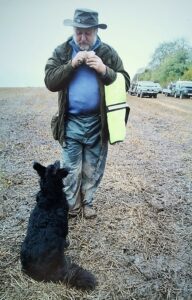“I knew he was dead” – neighbour recalls Land Rover horror
HSE has guidance on working safely under motor vehicles being repaired and has also issued a safety alert for air suspension systems on vehicles.
A Dorset man who found his friend and neighbour crushed to death under a car has urged mechanics and car enthusiasts not to cut corners.
Leslie House, 61, a self-employed agricultural engineer who was only months from retirement, was repairing a Land Rover Freelander for a customer in May 2020.
His neighbour Terry Bishop, a retired safety consultant in the nuclear industry, was asked to go and check on Leslie, known to everyone as Les, who was working on the vehicle on his driveway at Higher Muckleford near Dorchester.

“Nothing looked out of the ordinary at first,” said 65-year-old Terry. “I called out to Les several times but he didn’t respond. When I reached the front of the vehicle I could see Les’ legs sticking out with his feet flopped over to the sides and he was unresponsive to me.
“I grabbed his legs and tried to pull him out but couldn’t move him. It was then that I noticed the vehicle was off the wooden blocks he had been using. I tried to push the vehicle backwards up onto the blocks but it was too heavy. I immediately rang the emergency services for help.
“I felt for a pulse, but there was none and I suppose at that point I knew he was dead, but it doesn’t stop you trying does it? I ran to another neighbour for help, and she together with myself and my daughter again tried to move the vehicle back up onto the blocks and off Les, but the Land Rover was just too heavy.”
Les was pronounced dead at the scene by the emergency services. Terry told police that he found the vehicle’s handbrake was not on.
A single man known widely throughout the community, Les lived, together with his dog Ebby, next door to his mother June House. In the last few years of his life he had become her primary carer. She suffered from an untreatable degenerative spinal condition which meant she was in constant pain, largely immobile and virtually house-bound.
The task of breaking the tragic news to June fell to Terry. He said: “It was a surreal experience. It just didn’t sink in, either to June or myself.”

Les House was known for his expertise in maintaining Land Rovers following decades of experience gleaned from working with a nearby servicing and parts specialist. “There were very few faults that he had not previously come across or didn’t know how to overcome,” said Terry.
Reflecting on what went wrong on the day of Les’ death, Terry said: “The job he was doing was probably something he would have done hundreds and hundreds of times before. But for some reason on that day the handbrake wasn’t on. Truthfully, he shouldn’t have been using wooden blocks either.
“At the end of the day, this tragic accident was down to Les. It was his mistake by putting the vehicle up on those blocks. That said, given the kind of man he was, I know Les would want others to learn from his mistake and prevent further loss of life.
“There must be hundreds of near misses out there, where someone manages to get out just in time. But the simple message to the trade and car repair enthusiasts alike, is don’t cut corners. Cutting corners kills.”
Les took a keen interest in all things rural, with his real passion being vintage tractors and ploughing. He was a long-standing member of the West Dorset Vintage Tractor and Stationary Engine Club (DVTSEC), serving on its organising committee for many years. He was also a member of The Society of Ploughmen.
He was a staunch supporter of local charities. In addition to the extensive donations made by DVTSEC to a wide-range of causes and groups every year, Les and two friends organised an annual ploughing match, the proceeds of which were given to support the Dorset and Somerset Air Ambulance, a charity both he and his mother were firm proponents of.
“Les was someone I knew for 20 years. During that time we had got to know one another well and become good friends. We often popped into one another’s houses for a cup of coffee and a chat.
“He was on the cusp of retiring and had big plans. He was actually planning some projects with myself. At the time of his death, the country was in the middle of a national lockdown, but Les was raring to get going as soon as it ended.
“I know my friend lived his life the way he wanted, but the way it ended for him, which was so avoidable, really saddens me. I still miss him popping his head up over the garden fence for a chat or offering me some eggs.”
Les’ mum June died in June 2021. “I firmly believe Les’ passing hastened her end,” reflected Terry.
The death of Les House was raised with the Health and Safety Executive (HSE) but it was not reportable under the RIDDOR framework, so no HSE investigation was carried out.
The workplace regulator did however submit a report to the Coroner for Dorset, who, after an inquest, returned a verdict of accidental death.
HSE has guidance on working safely under motor vehicles being repaired and has also issued a safety alert for air suspension systems on vehicles.
HSE’s advice to the trade:
Never work beneath a vehicle that is only supported on jacks:
- Use axle stands that are in good condition and inspected every year
- Use stands on firm, level ground and securely located under a strong point on the vehicle
- Securely chock wheels remaining on the ground
- Do not exceed the rated capacity of the stand
Never work beneath a cab or tipping trailer unless it is propped:
- Always prop cabs, trailers etc that could drop under their own weight
- The prop should be locked in position before gaining access
- If there is no prop fitted, or if one is fitted but you are unsure it will be effective, provide your own
Never crawl beneath a vehicle fitted with air suspension unless it is properly supported:
- Prevent movement of air suspension, either by using suitably rated props or stands to prevent the chassis lowering or by deflating the system
- Don’t tamper with the ride height for the purpose of recovery or repair
Notes to editors
- The Health and Safety Executive (HSE) is Britain’s national regulator for workplace health and safety. We prevent work-related death, injury and ill health through regulatory actions that range from influencing behaviours across whole industry sectors through to targeted interventions on individual businesses. These activities are supported by globally recognised scientific expertise.
- More information on incidents that should be reported to HSE can be found here. Reporting of Injuries, Diseases & Dangerous Occurrences RIDDOR (hse.gov.uk)